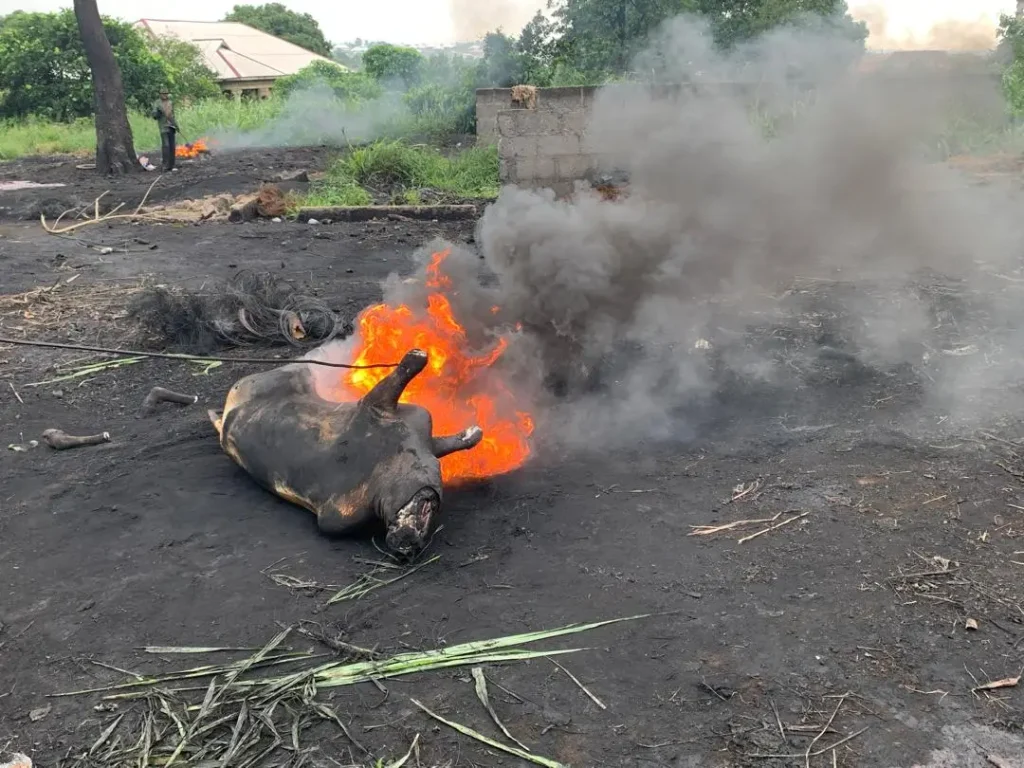The practice of singeing meat, a common method used to remove hair and improve texture, has come under scrutiny following a collaborative study conducted by the Faculty of Public Health Education at Akenten Appiah Menka University of Skills Training and Entrepreneurial Development (AAMUSTED) and Kwame Nkrumah University of Science and Technology (KNUST). The research, focusing on the potential health risks associated with different singeing methods, revealed alarming levels of cancer-causing chemicals in meat processed using burnt vehicle tires. This discovery raises significant concerns about public health, especially in regions where this practice is prevalent.
The study, led by Dr. Prosper Manu Abdulai of AAMUSTED, investigated the presence of polycyclic aromatic hydrocarbons (PAHs) in meat samples collected from Ghana’s five major cities: Kumasi, Accra, Koforidua, Tamale, and Ho. PAHs are a group of over 100 different chemicals released from burning organic substances like coal, oil, gas, wood, garbage, and tobacco. They are also formed when fat from meat drips onto a hot surface and creates smoke. These chemicals are known carcinogens, meaning they can cause cancer, and are also linked to other adverse health effects. The research team analyzed 180 samples of beef and mutton, comparing the PAH levels in meat singed using three different fuel sources: firewood, liquefied petroleum gas (LPG), and vehicle tires.
The results unequivocally demonstrated that singeing meat with vehicle tires introduced significantly higher levels of PAHs, particularly the highly carcinogenic compound Benzo[a]pyrene. The concentrations of Benzo[a]pyrene found in tire-singed cattle and goat meat were 23.1 mg/kg and 12.16 mg/kg, respectively. These levels exceed the 12 mg/kg safety limit established by the European Food Safety Authority (EFSA), highlighting the significant health risk associated with this practice. While washing and scraping the singed meat reduced the PAH levels, the concentrations in tire-singed samples remained dangerously high compared to those processed using firewood or LPG.
The health implications of these findings are particularly concerning for vulnerable populations, such as children and older adults, who are more susceptible to the harmful effects of PAHs. The researchers conducted a health risk assessment based on their findings and concluded that individuals consuming meat singed with either firewood or tires face a substantially increased risk of developing cancer. The study emphasizes the urgent need for public health interventions to address this issue and promote safer meat processing practices.
The researchers strongly advocate for a transition to safer singeing methods, particularly the use of LPG, which produced the lowest PAH levels during the study. LPG, a cleaner-burning fuel, significantly reduces the risk of PAH contamination compared to firewood and completely eliminates the risk associated with the highly toxic chemicals released from burning tires. They also call for stricter enforcement of regulations prohibiting the use of tires in meat processing, recommending the implementation of heavy penalties for violators. Ensuring compliance with these regulations will require robust monitoring and enforcement mechanisms at abattoirs and other meat processing facilities.
The study’s recommendations extend beyond simply changing the fuel source. Dr. Abdulai underscores the importance of establishing proper systems within abattoirs to ensure universal adoption of LPG for singeing. This comprehensive approach includes providing training and resources to butchers and meat processors, establishing standardized procedures, and implementing regular inspections to verify compliance. Furthermore, the researchers emphasize the need for public awareness campaigns to educate consumers about the health risks associated with tire-singed meat and empower them to make informed choices. These efforts must be complemented by ongoing research to further understand the long-term health consequences of consuming PAH-contaminated meat and to develop even more effective strategies for mitigating this risk.














